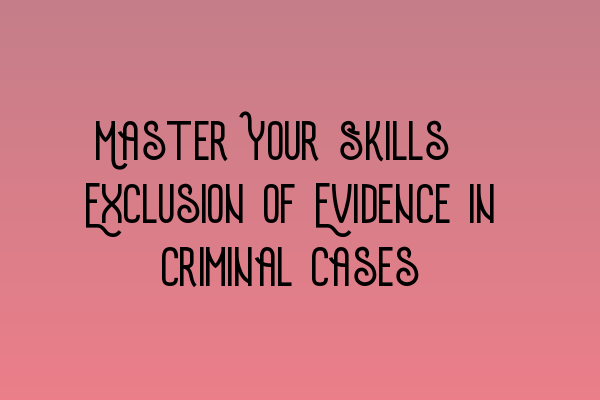Master Your Skills: Exclusion of Evidence in Criminal Cases
Welcome to SQE Criminal Law & Practice UK, where we aim to provide comprehensive guidance and resources to help aspiring solicitors master their skills. In today’s blog post, we will delve into the topic of the exclusion of evidence in criminal cases, a fundamental aspect of criminal law practice.
Before we begin, if you’re interested in testing your knowledge and preparing for the SQE 1 exam, you may find our SQE 1 Practice Exam Questions and SQE 1 Practice Mocks FLK1 FLK2 articles useful.
Understanding Exclusion of Evidence
Exclusion of evidence is a crucial aspect of criminal proceedings, aiming to ensure fairness and justice. It refers to the judicial decision to prohibit certain evidence from being presented or considered in court. This exclusion can be based on various grounds, including:
- Illegally obtained evidence
- Breaches of the defendant’s rights
- Unreliable or prejudicial evidence
Exclusion of evidence is governed by the rules of procedure, rules of evidence, and case law. As a criminal law practitioner, understanding these rules and their implications is essential to effectively represent your clients and secure favorable outcomes.
Legal Framework and Case Law
In the UK, the admissibility of evidence is governed by various legislation, including the Police and Criminal Evidence Act 1984 (PACE) and the Criminal Procedure and Investigations Act 1996 (CPIA). These acts set out the legal framework for the exclusion of evidence.
Moreover, case law plays a vital role in shaping the legal principles and tests applied to determine whether evidence should be excluded. Landmark cases such as R v. Sang and R v. Huckle have provided important guidelines and precedents in relation to the exclusion of evidence.
Grounds for Exclusion
There are several grounds on which evidence may be excluded in criminal cases. Let’s explore some of the most common grounds:
1. Illegally Obtained Evidence
When evidence is obtained in violation of a person’s rights, such as through an unlawful search or seizure, it may be excluded. The exclusionary rule seeks to deter law enforcement from engaging in unconstitutional practices.
One notable case highlighting this ground is the landmark decision in R v. Adams, where evidence obtained through an illegal search was excluded, leading to the acquittal of the defendant.
2. Breaches of the Defendant’s Rights
Any evidence that is obtained in breach of the defendant’s rights, such as the right to legal representation or the right to remain silent, may be excluded. This ensures that the accused receives a fair trial and that their rights are protected.
3. Unreliable or Prejudicial Evidence
Evidence that is deemed unreliable or highly prejudicial may also be excluded. This includes evidence that is improperly obtained, manipulated, or lacks credibility. The court’s primary concern is to prevent unfair prejudice to the defendant.
Impact on Criminal Proceedings
The exclusion of evidence can have a significant impact on the outcome of criminal proceedings. In some cases, the exclusion of crucial evidence may result in the collapse of the prosecution’s case, leading to acquittal or dismissal of charges.
Furthermore, the exclusion of evidence can also affect plea negotiations, trial strategy, and overall case management. As a solicitor, it is crucial to assess the potential consequences of evidence exclusion and strategize accordingly.
Preparing for your SQE Exams
If you’re currently preparing for the SQE 1 or SQE 2 exams, we recommend exploring our comprehensive SQE 2 Preparation Courses and SQE 1 Preparation Courses. These courses are designed to equip you with the necessary knowledge and skills to excel in your exams and future legal career.
For more information about the SQE exam dates and application process, you can refer to our article on SRA SQE Exam Dates.
Conclusion
The exclusion of evidence is a complex and highly significant aspect of criminal law practice. As a solicitor, mastering the rules, principles, and case law related to evidence exclusion is essential to effectively advocate for your clients and achieve favorable outcomes.
We hope this blog post has provided you with valuable insights into the topic. If you have any further questions or require legal assistance, feel free to reach out to our team at SQE Criminal Law & Practice UK.
